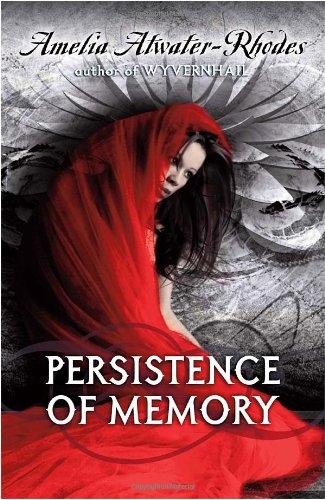
 Persistence of Memory by Amelia Atwater-Rhodes
Persistence of Memory by Amelia Atwater-Rhodes
I can’t deny that Persistence of Memory has an interesting premise. The protagonist, Erin, is a teenage girl who has been institutionalized most of her life due to multiple personalities and hallucinations. As the novel begins, Erin’s alternate personality, Shevaun, has been suppressed by drugs for about a year, and Erin is taking the first steps toward going to a regular high school and having a “normal” life. Right at this inopportune time, Shevaun reasserts herself and once again threatens to destroy Erin’s sanity, and perhaps her life.
The jacket copy suggests that the central plot of the story involves Erin trying to discover whether Shevaun is an alternate personality or whether she is actually a separate person who is psychically linked to Erin. I really liked this idea, and really felt for Erin in the early scenes as she struggled with her visions. However, this question is resolved far too quickly, dissipating a lot of the tension in the story. I think Atwater-Rhodes may have erred by giving showing us too many long, detailed scenes of Shevaun’s life. The question of Erin’s sanity would have been more ambiguous, and more compelling, had we been limited to brief, dreamlike scenes of Shevaun.
 Another point when too much is given away is when Erin’s friend Marissa mentions a death in her family. In any real-life conversation, if your new best friend tells you that two of her close relatives have died, wouldn’t you ask how? Wouldn’t you ask what happened? Instead, the whole thing just gets glossed over, and it’s too obvious, because that’s not really the way conversations work. It’s too much of a giveaway that the deaths tie in with the larger plot and that revealing the details would be a spoiler. Atwater-Rhodes would have done better to have Marissa tell Erin a half-truth, or just have Marissa be upset but not say why.
Another point when too much is given away is when Erin’s friend Marissa mentions a death in her family. In any real-life conversation, if your new best friend tells you that two of her close relatives have died, wouldn’t you ask how? Wouldn’t you ask what happened? Instead, the whole thing just gets glossed over, and it’s too obvious, because that’s not really the way conversations work. It’s too much of a giveaway that the deaths tie in with the larger plot and that revealing the details would be a spoiler. Atwater-Rhodes would have done better to have Marissa tell Erin a half-truth, or just have Marissa be upset but not say why.
As the plot unfolds, it moves away from its initial focus on Erin. Instead, it revolves around some (rather juvenile) bickering among vampires, shapeshifters, and witches over who is to blame for Erin’s problems and who should be fixing them. There are far too many characters for such a short book, most of whom don’t turn out to be important. There’s a major plot point that is raised, but as far as I can tell, dropped completely. Then there is more bickering, and Erin becomes more and more of a pawn in this story, until finally, in the climactic scene, she doesn’t actually do much of anything.
The prose struck me as very, very simple. I admit, I like a more lush and descriptive style of prose, especially in tales of the supernatural.
The biggest issue I had with Persistence of Memory, though, is as I mentioned above: Erin is too much of a pawn in her own story. She is introduced as a compelling, tragic character, and instead becomes a chip on the table in the middle of a big, overly-byzantine supernatural bicker-fest.



Sounds fascinating. I’ll look out for it.